Drug testing for remote workers remains legally enforceable across most industries, with 73% of companies now offering flexible testing options including mobile collections and telehealth-supervised procedures. Both employers and remote employees must understand evolving legal frameworks, testing methods, and rights to navigate this changing landscape effectively.
Key Takeaways
- Remote workers cannot avoid drug testing simply by working from home, as federal DOT regulations and safety-sensitive position requirements apply regardless of work location.
- Multiple testing methods exist for drug testing remote employees including mobile services, facility visits, and emerging telehealth-supervised collections, each with distinct cost and compliance implications.
- State cannabis laws create complex compliance challenges for multi-state employers, requiring updated policies that balance federal requirements with local protections.
- Employee rights remain protected during remote testing, including privacy accommodations, reasonable suspicion standards, and medical review processes for positive results.
- Oral fluid testing approval by DOT in 2023 has revolutionized drug testing for remote workers logistics, offering less invasive options with faster results and easier home-based collection.
- Technology integration through digital platforms and AI-driven compliance tracking is streamlining remote employee drug testing management for employers while improving employee experience.
Understanding Who Gets Tested in Remote Work
The scope of drug testing for remote workers depends heavily on job classification and industry regulations rather than work location. Federal law requires drug testing for specific positions regardless of where employees work, creating obligations that extend into home offices and distributed work environments. The Department of Transportation alone regulates over 12 million safety-sensitive workers who must comply with testing requirements even when performing administrative duties remotely.
Positions Always Subject to Testing:
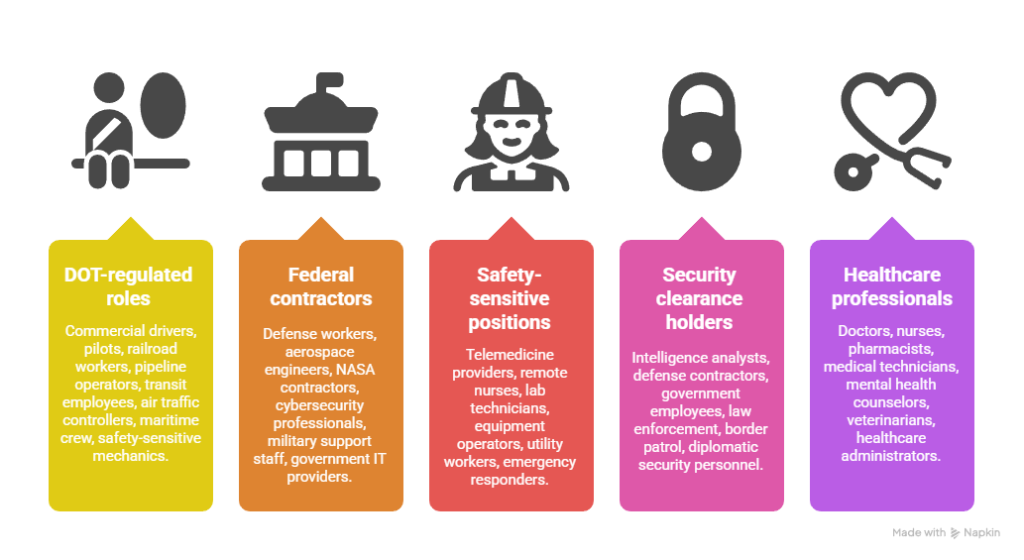
- DOT-regulated roles: Commercial drivers operating vehicles over 26,000 pounds, school bus drivers, transit operators, pilots flying commercial aircraft, air traffic controllers, railroad engineers and conductors, pipeline workers handling hazardous materials, maritime crew members on commercial vessels, and mechanics maintaining safety-sensitive equipment. These positions maintain testing requirements during remote administrative work, vacation standby periods, and when transitioning between field and office duties.
- Federal contractors: Defense industry workers with security clearances, aerospace engineers working on government projects, NASA contractors and subcontractors, cybersecurity professionals handling classified information, military support personnel, government consulting firms, federal construction contractors, and IT service providers managing government systems. Testing requirements apply to all employees regardless of remote work status, with some contracts requiring testing for family members with access to secure areas.
- Safety-sensitive positions: Healthcare workers providing direct patient care through telemedicine, nurses administering medications remotely, laboratory technicians handling controlled substances, heavy equipment operators on standby for emergency response, utility workers maintaining critical infrastructure, chemical plant supervisors monitoring operations remotely, construction foremen overseeing safety protocols, and emergency responders including paramedics and firefighters during administrative periods.
- Security clearance holders: Intelligence analysts working with classified information, defense contractors handling sensitive materials, government employees with top secret clearances, diplomatic security personnel, border patrol agents, customs officials, federal law enforcement officers, and civilian employees supporting military operations. Clearance levels from Confidential to Top Secret/SCI all maintain testing requirements during remote work assignments.
- Healthcare professionals: Registered nurses with prescriptive authority, doctors providing telehealth services, pharmacists managing controlled substance inventories, medical technicians handling laboratory specimens, mental health counselors with prescription privileges, veterinarians with controlled substance access, dentists performing procedures, and healthcare administrators with drug storage responsibilities. State medical boards often impose additional testing requirements beyond federal minimums.
For Job Seekers: Research your target role's classification before applying. Many companies conduct comprehensive background check processes that include drug testing for remote workers, even in regulated industries. Federal positions often require extensive screening including polygraph examinations, financial reviews, and ongoing monitoring programs. Check company policies during the interview process to understand testing expectations, frequency requirements, and methods used for remote workers.
For Employers: Clearly communicate testing requirements in job postings and offer letters alongside background check requirements. Remote work arrangements don't eliminate legal obligations, but they may require updated implementation procedures and vendor relationships. Consider developing position-specific testing protocols that account for varying levels of safety sensitivity and regulatory requirements within your organization.
Testing Methods Available for Drug Testing Remote Workers
Mobile Testing Services (Most Popular Option)
Mobile drug testing has become the gold standard for drug testing remote employees, with certified collectors traveling directly to employees' locations. This method maintains chain of custody integrity while accommodating distributed workforces, making it the preferred choice for 68% of companies with remote testing programs according to 2024 industry surveys. Mobile services have expanded rapidly to cover rural areas, with some providers offering same-day service in major metropolitan areas and 48-hour service in remote locations.
Mobile Testing Process:
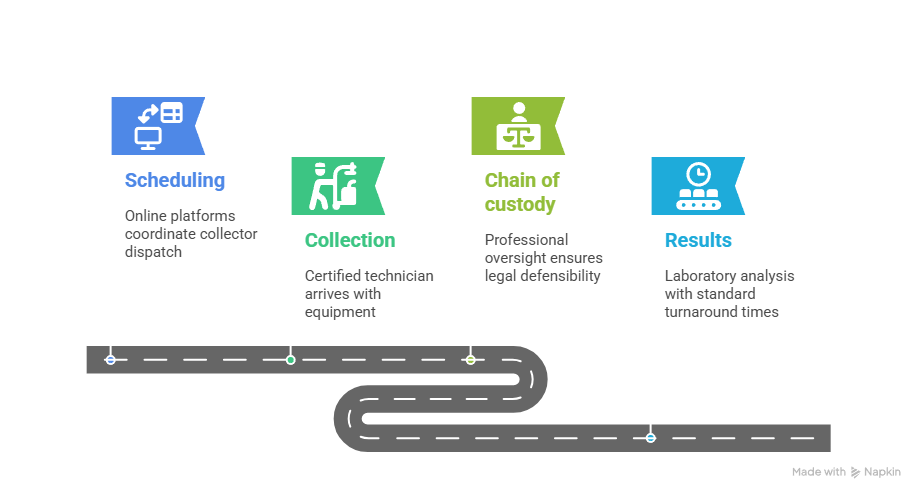
- Scheduling: Online platforms coordinate collector dispatch within 24-48 hours using GPS tracking and route optimization
- Collection: Certified technician arrives with full testing equipment, portable facilities when needed, and complete documentation systems
- Chain of custody: Professional oversight ensures legal defensibility of results with digital signatures and real-time reporting
- Results: Laboratory analysis with standard turnaround times of 1-3 business days, with expedited options available for urgent situations
The convenience factor makes mobile testing particularly valuable for random testing programs and reasonable suspicion situations. Collectors can reach remote locations including home offices, temporary work sites, offshore installations, and rural areas where traditional facilities may not be accessible. Advanced scheduling systems now integrate with HR platforms to automate compliance tracking and ensure testing deadlines are met across distributed workforces.
Oral Fluid Testing Revolution (2024 Game-Changer)
The DOT's 2023 approval of oral fluid testing for federally regulated positions has transformed drug testing for remote workers logistics. This method offers significant advantages for home-based collection including easier specimen collection, shorter detection windows, and reduced privacy concerns compared to urine testing. Oral fluid testing has shown 94% accuracy rates compared to traditional urine tests while providing results 40% faster on average.
Oral Fluid Testing Benefits:
| Aspect | Traditional Urine | Oral Fluid Testing |
| Collection Privacy | Bathroom observation required | Simple mouth swab procedure |
| Detection Window | 3-30 days depending on substance | 24-48 hours for most substances |
| Adulteration Risk | Higher tampering potential | Nearly impossible to manipulate |
| Remote Suitability | Complex chain of custody | Simplified collection process |
| Cost Efficiency | $45-75 per test | $55-85 per test |
| Result Speed | 24-72 hours | 12-48 hours |
For Employees: Oral fluid testing offers greater dignity and privacy during the collection process. The shorter detection window means recent legal activities (like prescription medications or over-the-counter drugs) are less likely to cause complications. Employees should avoid eating, drinking, or using tobacco products for 10 minutes before collection to ensure accurate results.
For Employers: Consider updating testing policies to include oral fluid options, especially for drug testing remote employees. The method reduces collection complications while maintaining regulatory compliance and can be integrated with existing background check procedures. Training programs should be updated to include oral fluid collection protocols and result interpretation guidelines.
Telehealth-Supervised Collections (Emerging Trend)
Telehealth-supervised drug testing represents the newest frontier in drug testing for remote workers, utilizing video technology to provide real-time oversight of at-home collections. While still in pilot phases across select industries, early adoption shows promise for non-DOT positions and pre-employment screening applications. Current pilot programs report 87% employee satisfaction rates compared to 64% for traditional facility-based testing.
The process involves employees receiving testing kits with detailed video call instructions for supervised collection. Certified technicians provide remote oversight through encrypted video platforms, maintaining chain of custody documentation electronically. However, legal acceptance varies by state and industry, requiring careful evaluation before implementation. Some states have specific regulations governing video-supervised collections, including requirements for recording retention and privacy protections.
Legal Framework: What Employers and Employees Must Know
Federal vs. State Law Conflicts
The most complex legal challenge in drug testing for remote workers involves navigating conflicts between federal requirements and state cannabis legalization laws. With 38 states now having some form of legal cannabis program, employers face difficult decisions about testing policies for remote workers living in different states than company headquarters. Recent court cases have established precedents that generally favor federal requirements over state protections, but litigation continues to evolve the legal landscape.
Cannabis Law Impact by State Category:
| State Type | Employee Protections | Employer Obligations | Remote Work Implications |
| Full Legalization | Off-duty use protection for most positions | Limited testing restrictions except safety-sensitive roles | Must respect employee home state laws while maintaining federal compliance |
| Medical Only | Patient protection rights with documentation | Reasonable accommodation required for medical users | Medical documentation requirements vary by state |
| Prohibition States | No protection from testing | Standard testing allowed for all positions | Consistent with federal requirements |
| Zero Tolerance | Enhanced testing authority | Broader testing permissions | May conflict with employee home state protections |
For Employees: Understand both your home state laws and your employer's headquarters state requirements. Legal cannabis use in your state doesn't automatically protect you from employer testing, especially in federally regulated positions. This information should be researched alongside standard background check requirements when evaluating job opportunities. Keep detailed records of any medical cannabis use and consult with employment attorneys if conflicts arise.
For Employers: Develop state-specific policy addendums addressing cannabis conflicts. Consider legal review for multi-state remote workforce policies to ensure compliance with varying local laws, and coordinate drug testing policies with background check procedures for consistency. Establish clear protocols for handling positive cannabis tests in legal states while maintaining federal compliance requirements.
Employee Rights During Remote Testing
Remote workers retain all standard drug testing rights with additional protections specific to home-based collections. Privacy rights become more complex when testing occurs in personal spaces, requiring employers to establish clear protocols that respect both compliance needs and personal boundaries. The Equal Employment Opportunity Commission has issued specific guidance addressing remote testing accommodations for disabled employees and religious considerations.
Protected Employee Rights:
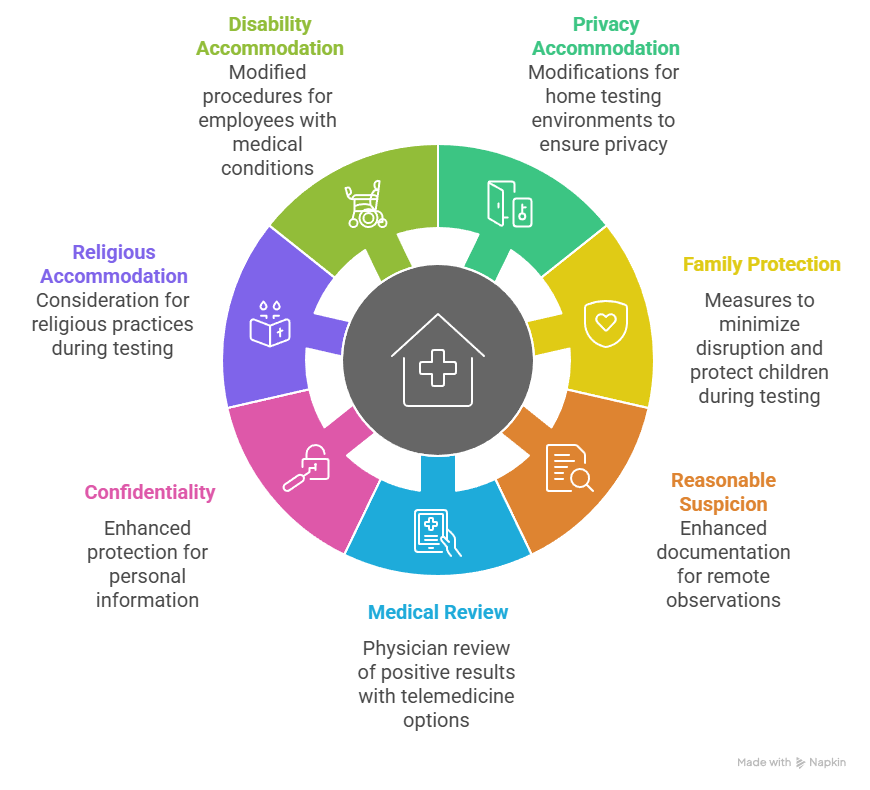
- Privacy accommodation: Reasonable modifications for home testing environments including alternative collection locations
- Family protection: Limiting collector access to minimize family disruption and protecting children from exposure to testing procedures
- Reasonable suspicion standards: Same documentation requirements as office-based testing with enhanced record-keeping for remote observations
- Medical review process: Qualified physician review of positive results regardless of collection location, with telemedicine options available
- Confidentiality: Enhanced protection for home address and personal information with strict data security requirements
- Religious accommodation: Consideration for religious practices that may conflict with testing procedures or timing
- Disability accommodation: Modified procedures for employees with medical conditions affecting specimen collection
Documentation requirements often exceed traditional testing due to unique home environment considerations. Employees should understand their rights to request alternative testing locations if home-based collection isn't practical or creates undue privacy concerns. Legal precedent supports reasonable accommodation requests, though employees cannot avoid testing entirely based on privacy preferences.
Industry-Specific Requirements for Drug Testing Remote Employees
The transportation industry faces the most stringent requirements for drug testing remote workers, with DOT regulations applying regardless of work location or duty type. Commercial drivers performing dispatching, administrative, or customer service duties from home remain in the random testing pool and subject to all regulatory requirements including reasonable suspicion, post-accident, and return-to-duty testing. The Federal Motor Carrier Safety Administration has clarified that remote work status doesn't alter testing obligations for safety-sensitive employees.
Transportation Sector Adaptations:
- Nationwide testing networks: Contracts with multi-state mobile providers ensuring coverage in all operational areas
- 24/7 availability: Emergency testing for post-accident situations with guaranteed response times
- Return-to-duty protocols: Specialized procedures for remote workers including telehealth consultations with substance abuse professionals
- Record keeping: Enhanced documentation for distributed workforces with digital tracking systems
- Integrated screening: Coordination with ongoing background check requirements and driving record monitoring
- Cross-border considerations: Special protocols for drivers working internationally or crossing state boundaries
Healthcare organizations managing remote workers must balance federal requirements with professional licensing considerations and state medical board regulations. Telehealth providers, remote nurses, and healthcare administrators with controlled substance access maintain testing requirements even when providing services from home offices. The Drug Enforcement Administration has maintained strict oversight of remote healthcare workers, particularly those prescribing controlled substances through telemedicine platforms.
Healthcare Remote Testing Considerations:
| Role Type | Testing Requirements | Compliance Factors |
| Telehealth Providers | State licensing board requirements plus federal oversight | Multi-state practice implications and DEA registration |
| Remote Nurses | Hospital/employer policies plus professional standards | Patient safety considerations and liability coverage |
| Healthcare Administrators | Controlled substance access plus financial responsibility | DEA registration requirements and audit compliance |
| Medical Coders | HIPAA compliance plus background check requirements | Patient information access and data security protocols |
For Job Seekers: Research industry-specific requirements before pursuing remote positions. Healthcare and transportation sectors maintain the highest testing frequencies and strictest compliance standards, often requiring comprehensive background check processes alongside drug testing for remote workers. Professional licensing boards may have additional requirements beyond employer policies, including continuing education about substance abuse and reporting obligations.
For Employers: Maintain relationships with testing providers that understand industry-specific requirements and can accommodate urgent testing needs for remote workers while coordinating with background check vendors for streamlined employee screening. Consider specialized vendors with experience in your industry's unique regulatory environment and compliance challenges.
State-by-State Variations in Drug Testing Remote Workers
High-Impact State Regulations
Certain states have implemented specific provisions affecting drug testing for remote workers that create compliance challenges for multi-state employers. Understanding these variations helps both employers and employees navigate their rights and obligations effectively. The patchwork of state laws creates particular complexity for companies with remote workers distributed across multiple jurisdictions.
Notable State Variations:
- California: Strict privacy protections require advance notice and reasonable accommodation for home-based testing. Employers must justify business necessity for testing remote workers in non-safety-sensitive positions, with enhanced requirements when coordinating with background check processes. The California Consumer Privacy Act adds additional data protection requirements for remote testing information.
- New York: Enhanced worker protections include restrictions on cannabis testing for most positions, though federal contractors and safety-sensitive roles maintain standard requirements. Recent legislation also impacts how drug testing for remote workers integrates with background check procedures, requiring separate consent processes and enhanced notification requirements.
- Nevada: Prohibits pre-employment cannabis testing for most positions but allows continued employment testing. Remote workers benefit from these protections regardless of employer location, though background check requirements remain unaffected. The state has specific provisions for medical cannabis users working remotely.
- Colorado: Lawful off-duty conduct protections extend to legal cannabis use, though employers can maintain testing for safety-sensitive positions and federal compliance. Recent court decisions have clarified that remote work location doesn't eliminate these protections, creating challenges for out-of-state employers.
- Texas: Maintains broad employer testing authority with minimal restrictions, but recent legislation addresses privacy concerns for home-based collections. The state has specific provisions for oil and gas workers who may work remotely but remain subject to federal pipeline safety regulations.
- Florida: No cannabis protections but enhanced privacy requirements for home-based testing, including restrictions on video recording and family member interactions during collections.
For Employees: Research your home state's specific protections and understand how they interact with your employer's testing policies. State protections may provide additional rights beyond federal minimums and can affect both drug testing for remote workers and background check procedures. Consider consulting with employment attorneys if you believe your rights have been violated during remote testing processes.
For Employers: Develop state-specific policy addendums addressing local variations while maintaining consistent safety standards across your organization and coordinating with background check compliance requirements. Regular legal review is essential as state laws continue evolving rapidly in this area.
Practical Implementation Guide
For Employers: Setting Up Drug Testing Programs for Remote Workers
Successful implementation of drug testing for remote workers requires comprehensive planning that addresses policy development, vendor selection, technology integration, and employee communication. Start with a thorough audit of current testing requirements and workforce distribution to identify specific needs and challenges. Companies that invest in proper planning report 60% fewer compliance issues and 40% higher employee satisfaction with testing programs.
Implementation Timeline:
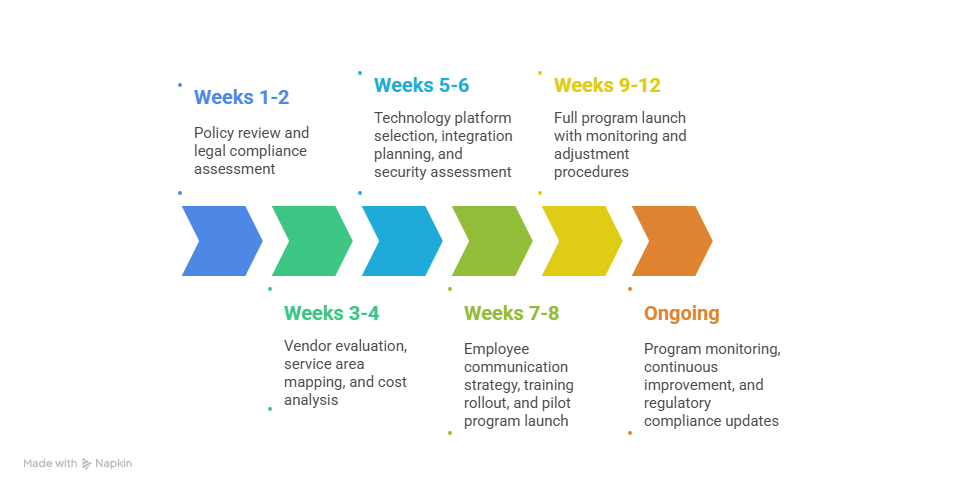
- Weeks 1-2: Policy review and legal compliance assessment including state law analysis
- Weeks 3-4: Vendor evaluation, service area mapping, and cost analysis
- Weeks 5-6: Technology platform selection, integration planning, and security assessment
- Weeks 7-8: Employee communication strategy, training rollout, and pilot program launch
- Weeks 9-12: Full program launch with monitoring and adjustment procedures
- Ongoing: Program monitoring, continuous improvement, and regulatory compliance updates
Vendor Selection Criteria:
- Geographic coverage: Service availability across your remote workforce locations with documented response times
- Certification standards: Proper licensing, chain of custody procedures, and laboratory accreditations
- Technology integration: API capabilities, digital reporting features, and system compatibility
- Response times: Emergency and routine testing availability with guaranteed service level agreements
- Compliance expertise: Understanding of industry-specific requirements and regulatory updates
- Service integration: Ability to coordinate with background check providers and other screening services
- Quality assurance: Error rates, customer satisfaction scores, and audit results
- Financial stability: Company longevity, insurance coverage, and financial ratings
For HR Professionals: Establish clear escalation procedures for situations where standard remote testing isn't feasible. Consider backup options including alternative testing locations, emergency protocols, and ensure coordination with existing background check workflows. Develop comprehensive training programs for managers who may need to identify reasonable suspicion situations in remote work environments.
For Employees: Preparing for Drug Testing as Remote Workers
Remote workers should understand their testing obligations and prepare for various collection scenarios to ensure smooth compliance with employer requirements. Preparation includes understanding your rights, organizing necessary documentation, and knowing what to expect during different testing procedures. Well-prepared employees experience 75% fewer collection delays and complications.
Employee Preparation Checklist:
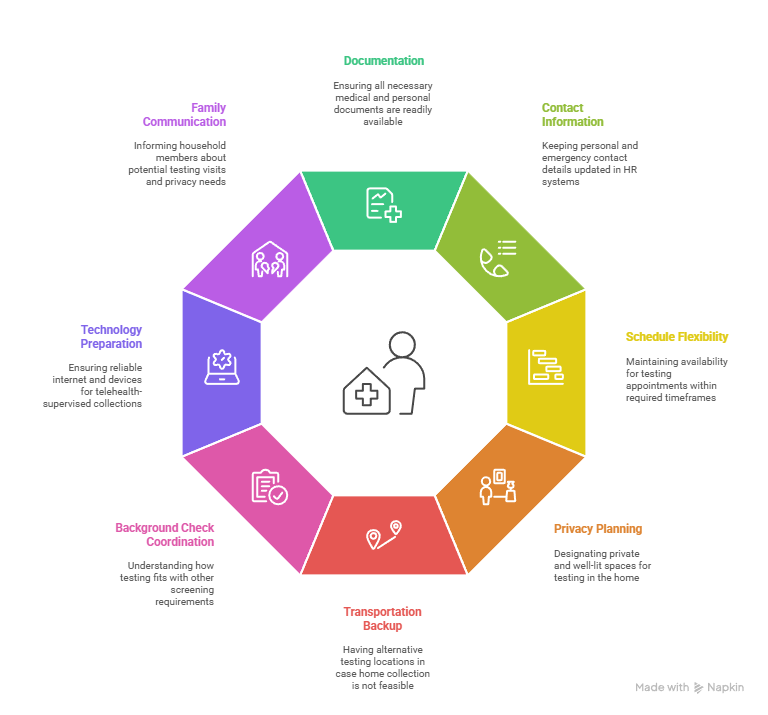
- Documentation ready: Current prescriptions with dosage information, medical authorizations, and physician contact information
- Contact information: Updated address, phone numbers, and emergency contacts in HR systems
- Schedule flexibility: Availability for testing appointments within required timeframes, including backup dates
- Privacy planning: Designate appropriate collection spaces in your home with adequate privacy and lighting
- Transportation backup: Alternative testing locations if home collection isn't possible or practical
- Background check coordination: Understanding how testing fits with other screening requirements and timelines
- Technology preparation: Reliable internet connection and devices for any telehealth-supervised collections
- Family communication: Inform household members about potential testing visits and privacy requirements
Conclusion
Drug testing for remote workers has evolved from a logistical challenge into a sophisticated compliance discipline that balances workplace safety with employee flexibility. The emergence of mobile testing services, oral fluid testing approval, and telehealth-supervised collections provides multiple pathways for maintaining regulatory compliance while supporting distributed workforces. Success requires understanding the complex interplay between federal requirements, state laws, and practical implementation challenges, often coordinated with comprehensive background check procedures. Both employers and employees benefit from staying informed about emerging trends, technology solutions, and legal developments that continue shaping this dynamic field. As remote work becomes permanently embedded in American business culture, effective programs for drug testing remote employees integrated with thorough background check processes will remain essential for maintaining workplace safety and regulatory compliance across distributed teams.
Frequently Asked Questions
Can you refuse drug testing as a remote worker?
No, you generally cannot refuse drug testing for remote workers if it's required by your employer's policy or federal regulations. Refusal typically results in the same consequences as a positive test result, including potential termination. However, you may request reasonable accommodations for the testing method or location while still complying with the requirement.
Do all remote jobs require drug testing?
No, not all remote jobs require drug testing. Testing requirements depend on industry regulations, company policies, and job responsibilities. DOT-regulated positions, federal contractors, healthcare roles, and safety-sensitive positions typically maintain testing requirements regardless of remote work arrangements, while many office-based remote positions may not require testing. Companies often coordinate drug testing for remote workers with background check requirements during the hiring process.
How do companies conduct drug testing for remote workers?
Companies use several methods including mobile testing services that come to employees' homes, requiring visits to designated testing facilities, telehealth-supervised at-home collections, and oral fluid testing. The specific method depends on company policy, regulatory requirements, and practical considerations like geographic location.
Can remote workers be randomly drug tested?
Yes, remote workers in positions subject to random drug testing programs remain eligible for selection regardless of work location. DOT-regulated employees, safety-sensitive positions, and other federally mandated programs maintain random testing pools that include remote workers, with mobile services coordinating collections as needed.
What happens if you fail drug testing for remote workers?
Failing drug testing for remote workers results in the same consequences as failing an in-person test, including potential termination, suspension, or required participation in substance abuse programs. The process includes medical review by qualified physicians and standard appeal procedures, with consequences varying by employer policy and regulatory requirements.
Are there privacy protections for drug testing remote workers?
Yes, remote workers have privacy protections including reasonable accommodation requests for collection locations, professional collection procedures that minimize family disruption, and confidentiality protections for personal information. However, these protections must balance with employer compliance needs and chain of custody requirements.
How much advance notice do remote workers get for drug testing?
Advance notice varies by testing type and state requirements. Random testing typically provides 24-48 hours notice for scheduling mobile collections, while reasonable suspicion testing may require immediate compliance. Pre-employment testing usually allows several days for scheduling, and some states mandate specific minimum notice periods.
Can employers conduct drug testing for remote workers living in cannabis-legal states?
Yes, employers can generally conduct drug testing for remote workers for cannabis even in states where it's legal, particularly for federally regulated positions and safety-sensitive roles. However, some states provide protections for off-duty legal use, creating complex compliance situations that require careful policy development and legal review, often coordinated with background check compliance requirements.
Additional Resources
- DOT Drug and Alcohol Testing Procedures (49 CFR Part 40)
https://www.transportation.gov/odapc/part40 - SAMHSA Drug Testing Resources for the Workplace
https://www.samhsa.gov/workplace/drug-testing-resources - SHRM Drug Testing Policy Templates and Guidance
https://www.shrm.org/topics-tools/tools/policies/drug-testing-policy-random-testing - EEOC Guidance on Disability-Related Inquiries and Medical Examinations
https://www.eeoc.gov/laws/guidance/enforcement-guidance-disability-related-inquiries-and-medical-examinations-employees - National Institute on Drug Abuse (NIDA) - Drug Testing Research
https://nida.nih.gov/research-topics/drug-testing

GCheck Editorial Team
Meet the GCheck Editorial Team, your trusted source for insightful and up-to-date information in the world of employment background checks. Committed to delivering the latest trends, best practices, and industry insights, our team is dedicated to keeping you informed.
With a passion for ensuring accuracy, compliance, and efficiency in background screening, we are your go-to experts in the field. Stay tuned for our comprehensive articles, guides, and analysis, designed to empower businesses and individuals with the knowledge they need to make informed decisions.
At GCheck, we're here to guide you through the complexities of background checks, every step of the way.






